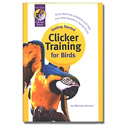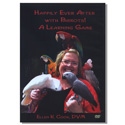Time "flies"
For six years I have been writing a monthly letter to you. In the beginning, back in 2002, "Karen's Letter" was usually about new products and events, but gradually I began using the letter to talk about the science of training, and about the impact of the new technology we are developing from that science.

Now I have written a book, Reaching the Animal Mind, about that technology and its impact. It's going to be published in September by Scribner, a division of Simon & Schuster. We'll be able to start taking advance orders for the book in late summer. It's a long book, three times as long as Don't Shoot the Dog, and it's full of stories, some of which first appeared in Letters from Karen.
I spent the better part of the last two years slogging away on that book. I checked my facts with Skinnerians, with animal behaviorists, and with zoo friends, from curators to keepers, all over the world. I flew around the country to interview famous neuroscientists (that was actually a LOT of fun, you might be surprised to know). I stayed home from the office for weeks and, toward the end, for months at a time, behind locked doors, phone turned off, mail and papers unread, chained to my computer.
I've put into that book pretty much every heavy-duty thought I presently have about what we do and how and why it works. So right now I don't want to write any more heavy-duty essays. (Please read the book for the good stuff!) But because I do want to stay in touch, every month I'm going to share a little bit about what's going on with me. I hope that's okay with you.
A feathered friend
So, let me tell you about my canary. I was lonely, plugging away in my home office day after day after day. It occurred to me that a singing bird might be company, so I went to my local pet shop to see Dolores, who keeps a lot of birds. I asked her if she could order me a roller canary. German breeders in the last century developed two kinds of singers, rollers, who sing a soft, burbly song like a thrush, and choppers, who have a loud, percussive, brassy sort of song. Dolores said she'd look into it, and I forgot about it.
Six months later I was in the pet shop and a wonderful song lifted itself above the general hubbub in the bird department. I went to see. It was one of the male canaries, whose color was so intense it was like a sign, "I am YELLOW!" and whose voice was similarly attention-getting, "I am SINGING!" I went closer. The cage was on a high shelf and I was level with the bottom. That canary stopped singing, came down to the floor of the cage, hopped over to my corner so his beak was about three inches from my nose, made eye contact with me, opened his beak, and poured out music. Okay, okay, I get it, I'll take you home.
With the cage and other costs this became a rather expensive proposition, but the bird came home and was established in my office. I soon found out that this bird can sing more or less constantly for approximately four hours in the morning, with other bouts during the rest of the day. (On a good day he can put in an extra hour at night, even in mid-winter, singing duets with the television.) And he is not a roller, he's a chopper. I got the brasses, not the winds; thinking of oboes, I brought home a trumpet.
It was, in fact, a Bit Much while writing, so I moved him to the front of the house where there's more going on and where he seems busy and happy. Like many canaries, he sings when the water is running, when the vacuum is running, and whenever he hears conversation. His songs are interesting, full of variety, beautiful—but really, really loud. I'm used to it, but some people, including company president Aaron, find it appallingly distracting. I usually take my business phone calls in the kitchen to reduce the bird factor.
Clever cuer
I think this bird was hand-raised, because he seems imprinted on people. My upstairs neighbor, Chris Dowd, takes care of him while I'm away. Chris is a very observant animal person. She found out how to elicit wing-fluttering, the food-begging posture of a chick, by presenting her hand to him in a certain way, which for me confirms the likelihood that he is imprinted. Chris pointed out to me that the bird starts to sing when my car pulls in the driveway. Isn't that nice? Once she commented on it, I noticed it, too.
In birds, early conditioning to humans can wreck future breeding attempts (fine with me, as I have no interest in having MORE canaries), but it makes for a good pet. So did I teach him to sit on my hand, and to fly around the room following a laser target? Hey, come on. Of course I could do that. The bird would love it. Twitchett, my terrier, old, stiff, blind, and deaf as she is, would be very excited. But I had a book to write.
I do take care of him—feed him, clean the cage, give him a bathing dish once a week (he only wants it once a week), and so on. I nursed him through an awful infestation of red mites. He shed all his feathers and I thought he was going to die, but modern chemistry came to the rescue in the form of a fumigant you hang in the cage forever—probably giving him liver cancer in his old age, but hey. The mites were hideous. (Luckily I had a great advisor in this crisis, Boston resident and friend Irene Pepperberg, of Alex the parrot fame.)
About the bird's old age—I assumed the canary would be a passing fancy, two years of responsibility at best. No, it seems canaries live ten years or more—oof! But, it is easy for a distracted author to forget to check the bird's cage on a routine basis; I could neglect him, accidentally. Hmm.
As I sat down to tell you about my bird, I realized he has taken control of his own care. In addition to frequently bathing me with song, always sung deliberately in my direction, he also makes eye contact and chirps, loudly, peremptorily, from time to time when I'm passing by. As with my fish years ago (Chapter 13 in Reaching the Animal Mind), I have learned to respond. "You need something. What do you need? Ah, water is low. Seed needs refreshing. A little lettuce would be appreciated. Thanks for the cue, bird!" Click.
Karen Pryor








Post new comment